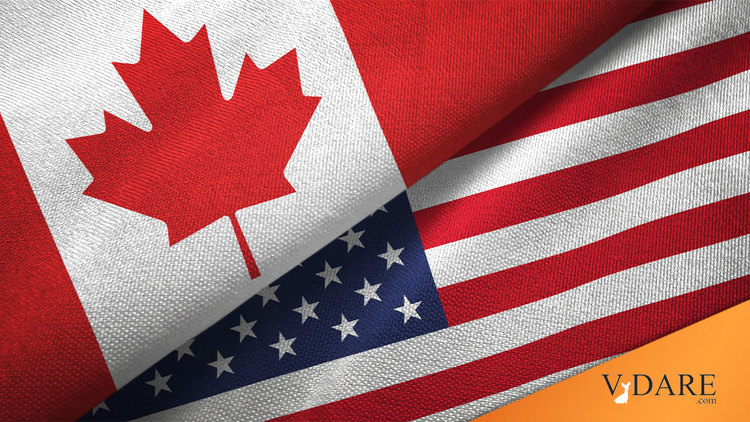
The Americas: Canadian Free Traders in Retreat
02/07/2006
Republished on VDARE.com on February 07, 2006
Wall Street Journal, November 13, 1987
MONTREAL — The recently concluded U.S.-Canada free-trade agreement is in trouble north of the border. Both opposition parties, the socialist New Democratic Party led by Edward Broadbent and the Liberals led by John Turner, have come out strongly against it. And politically, the opinion polls show these parties virtually neck and neck, far ahead of the Progressive Conservative government of Prime Minister Brian Mulroney. Free trade may have become embroiled in the peculiarly Canadian tangle of political and regional pathologies that go far to explain why the country has never fulfilled the prophecy, made by so many of its public men in the early 1900s, that the 20th century would belong to Canada.
Canada’s political system, adopted more or less uncritically from Britain, makes no provision for regional balance, as provided by the U.S. Senate. On the national level, Canada is essentially a unitary state, dominated by the interests of the population centers in "central Canada" — Ontario and Quebec. Traditionally, this has meant high tariffs, so that inefficient industries (and labor unionists) in central Canada are in effect subsidized by consumers in the periphery regions.
The consensus among central Canada’s elite in favor of protectionism, or "Canadian nationalism" as it was ingeniously renamed in the 1960s, was so complete that Brian Mulroney’s sudden decision to seek a free-trade agreement after his election in 1984 came as a surprise. Fear of protectionist rumblings in Washington, and pressure from Progressive Conservatives in pro-free-trade western Canada, undoubtedly played a part in his decision to push an idea he actually opposed while running for his party’s leadership in 1983.
Unfortunately, by the time the agreement was concluded, Mr. Mulroney’s government was already profoundly unpopular. Mr. Mulroney is a "Red Tory" — he belongs to the Progressive Conservative equivalent of the Eastern establishment-wing of the Republican Party. His political strategy was to appeal to the party’s traditional opponents in the French-speaking province of Quebec while also courting Canada’s powerful "new class" of bureaucrats and other tax consumers, calculating that its traditional supporters had no place else to go. Needless to say, he has ended up pleasing no one.
In fact, Canada’s ethnic and regional divergencies may be so great that no such balancing act can succeed for long. The preceding Liberal government of Pierre Trudeau ended amid equally universal opprobrium. Both of Canada’s major parties are thus discredited. Demonstrably not being either of them is the chief asset of the NDP, which has been leading some opinion polls for the first time in its history.
As a socialist party, the NDP is against free trade and anything else that depoliticizes the economy. But it is also responding to the labor unions of central Canada, upon which it vitally depends, notwithstanding some vestigial alliances in Canada’s other regions. Its popularity has put great pressure on Mr. Turner’s Liberals, terrified of being outflanked on the left.
Mr. Mulroney need not call a federal election until 1989, and his majority in the House of Commons is large enough to impose the free-trade policy if he wishes. However, he has proved to be a weak leader, easily swayed by pressure groups. Many Liberals and NDPers are confident the agreement can be stopped, finishing off the government in the process.
Still, the game may not be over. Western Canadians seem to be in the process of finding some place else to go. Earlier this month, a new pro-free-trade group called the Reform Party was founded in Winnipeg: It is widely expected to win seats in the next federal election, and will certainly place Mr. Mulroney under severe countervailing pressure.
Free trade has also found supporters in Quebec. Provincial Premier Robert Bourassa has endorsed it, perhaps because of his personal commitment to hydroelectricity megaprojects that need a U.S. market. Even some prominent Quebec separatists favor free trade, for the interesting reason that improved economic links with the U.S. will make it more difficult for their opponents to claim that severing the Canadian connection would mean instant poverty. Overall, a Toronto Globe and Mail poll found a plurality of Canadians nationwide favoring the free-trade agreement.
But it is hard to avoid the sinking feeling that special-interest groups may yet prevail over this sensible consensus. Recently John Turner defended his vacuous, xenophobic trade sentiments on television and was afterward spontaneously congratulated by journalists on his "speaking up for Canada." Canada could remain, in the words of its own de Tocqueville, the Victorian commentator Goldwin Smith, "rich by nature, poor by policy."
—
Mr. Brimelow, author of "The Patriot Game: Canada and the Canadian Question Revisited" (Hoover Institution Press, 1987), is a senior editor of Forbes magazine and a visiting associate of the Americas Society.
